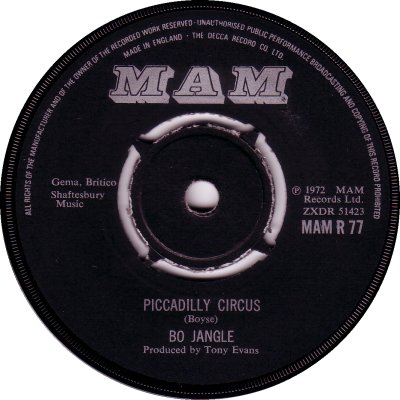
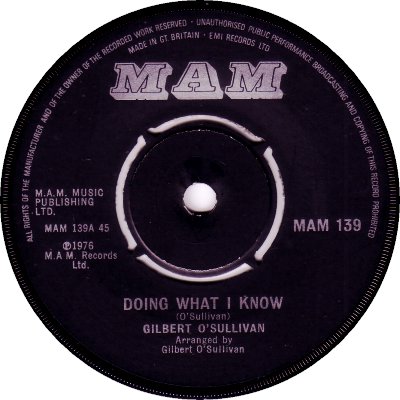
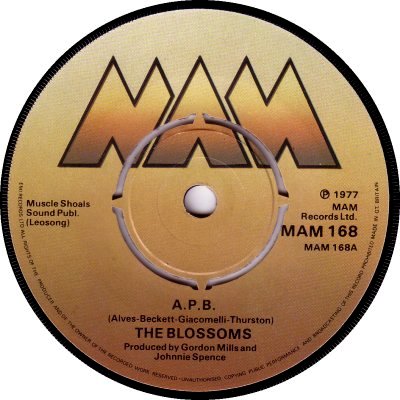

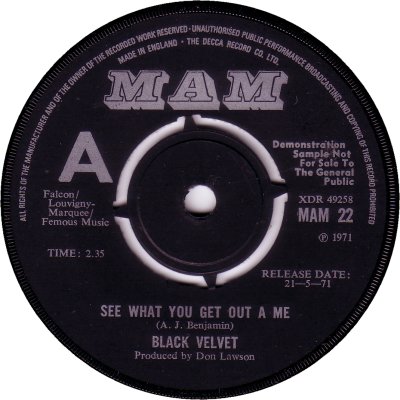
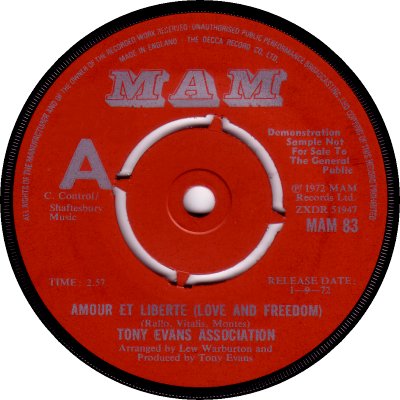
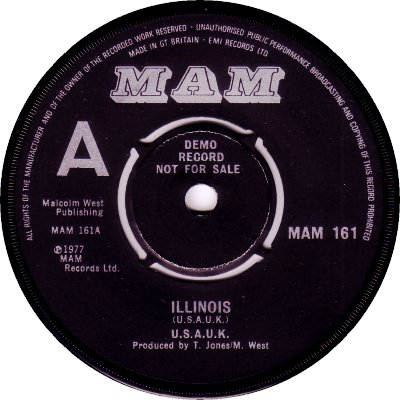
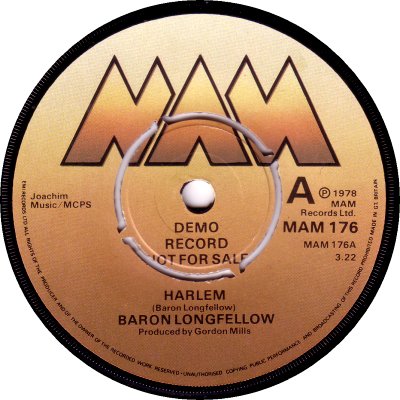
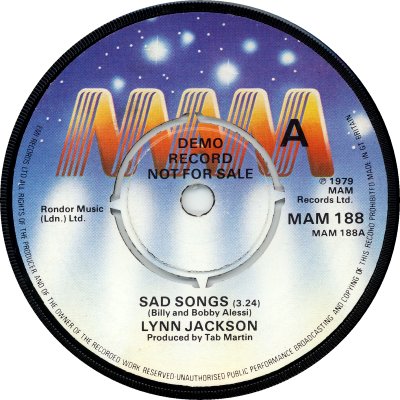
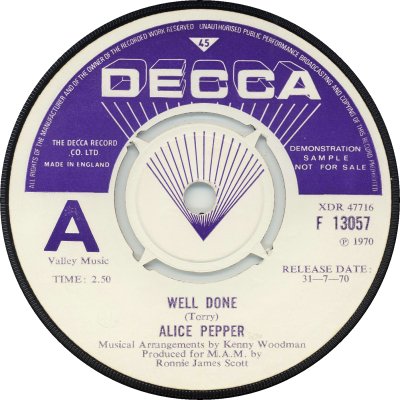

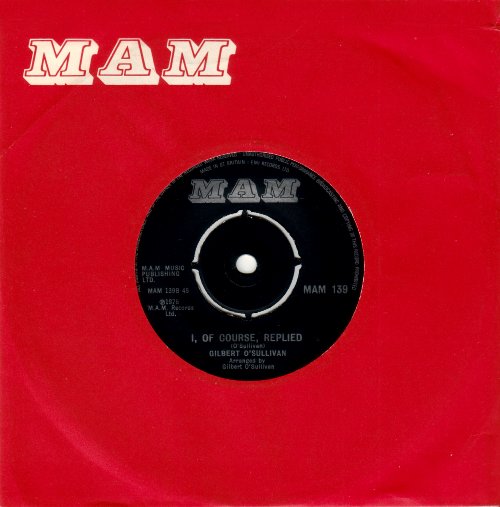
Set up in 1967 by Gordon Mills, Tom Jones and Gerry Dorsey, MAM started life as Management Agency and Music. In 1970 it extended its interests beyond artist management, setting up a production company and starting its own record label. The first hint of those developments came in 'Record Retailer' of the 12th of March 1969, which said that Mills intended to launch his own label; 'RR' of the 7th of May was able to report that it would be pressed and distributed by Decca, and that it was due to be launched later that year. 'RR' of the 15th of November was cautiously optimistic that the label would still appear before the end of the decade, if plans for it were completed in time, and it was able to reveal that the label's name would be 'Button'. The new decade was born without Button being launched, however, and six months of it passed before there was any more news. Then in the issue of the 6th of June 1970 'RR' was able to give a new date for Button's launch: September. Billboard of the 13th of June confirmed the 'Button' name and claimed that it was going to number Jones and Engelbert Humperdinck amongst its artists, but in the event both Jones and Humperdinck remained with Decca. 'RR' of the 27th of June again gave September as the starting date for the new label, but it said that in the meantime Button product would be released on Decca: the first single was intended to be Derek John Tilley's 'Sunny Day'. 'RR' of the 4th of July gave a date for that record - the 17th of July - and added a second single, 'Stand Up And Be Counted' by Pebbles. Even with the company's product about to hit the shops, there came a late change of plan concerning the new label's name. 'RR' of the 4th of July, noting the singles' forthcoming release, has them both as Button productions, but the following week's issue (11th July) hinted that the 'Button' name was likely to be dropped. Sure enough when the singles came out - 'Sunny Day' on Decca (F-13043) and 'Stand Up And Be Counted' on Deram (DM-305) - the production credits on the labels referred to M.A.M. not Button. Four more M.A.M. productions came out on Decca over the course of the next few months: 'We're On The Right Track' by Demick Armstrong (F-13056; 24th July); 'Well Done' by Alice Pepper (F-13057; 31st July); 'Thunderbird' by Carl Groszman (F-13065; 14th August); and Toomorrow's 'I Could Never Live Without Your Love' (F-13070; 21st August). Then, after another slight delay, 'RR' of the 31st of October was able to announce that the first three singles on the actual MAM label would be released that week.
MAM enjoyed the perfect start to its existence when its debut single, Dave Edmunds's 'I Hear You Knocking' (MAM-1), shot to No.1 in the Charts. Its third single, 'Nothing Rhymed' by Gilbert O'Sullivan, also charted, making the the Top 10; O'Sullivan was to be the label's principal hitmaker over the next four years. Lynsey De Paul supplied three hits in 1972-73, but elsewhere successes proved hard to come by, and by the middle of the decade the company was in the doldrums. Efforts were made to bring about a revival of its fortunes: 'Music Week' of the 10th of April 1976 reported that MAM had moved from Decca and had signed a long-term licensing deal with EMI. The article quoted managing director Geoffrey Everitt as saying that the company "Will be doing everything possible to re-establish itself as a powerful force in the marketplace, both with major and new acts". In October 1977, with MAM-168, the original black label was replaced by something more adventurous (3); according to Billboard (12th November 1977) the company was revamping its label identity and direction, with new studios in Los Angeles bringing in American products. Some nine months later, however, 'MW' of the 26th of August 1978 described MAM as having been "in limbo" for a year; the article said that efforts were being made to revitalize it, with new staff and talent being recruited. There was another change of label design in May 1979, but more troubled times lay ahead.
Towards the end of the decade MAM parted company with O'Sullivan, who moved on to CBS and sued his old label. No singles were issued on MAM during the last six months of 1979; then at the start of 1980 it was badly affected by ructions at EMI following the closure of that company's Licensed Repertoire Division - as a result of the closure responsibility for handling MAM and several of the other LRD labels was transferred to Liberty / UA ('MW', 26th January 1980). A move to Pye for pressing and distribution followed in June 1980; a couple of MAM singles came out on Pye labels before the deal was signed and sealed, as there was a possibility of a merger between Pye and RCA and Geoffrey Everitt didn't want MAM to be caught up in any more reshuffles. The singles concerned were a reissue of Dave Edmunds's 'I Hear You Knocking' (Blueprint, BLU-2010; 4/80), and 'I Commute' by Steven Kent (Pye, 7P-184; 6/80). Sadly, the move to Pye doesn't seem to have improved matters, and the final MAM single appeared in February 1982. 1985 saw a merger with Chrysalis to form Chrysalis Group Ltd, by which point - according to Billboard (6th April 1985) - most of MAM's revenue was derived from jukeboxes, amusement machines and hotel interests.
With regard to label designs, prior the the introduction of the MAM label a handful of MAM productions were issued on Decca or Deram with a credit to MAM at the bottom (10). The first actual MAM label was a sober affair, with just the company's logo in silver on a plain black background (1). The design remained basically the same after the move from Decca / Selecta to EMI, with just a change of wording at the top and a slight shifting-around of the minor credits; in addition the dinking perforations grew narrower (2). The MAM-0 catalogue series remained unchanged, though the 'R' which had followed the 'MAM' on certain Decca issues was no longer used - it had signified items which were subject to licensing restrictions abroad. October 1977 saw the introduction of a restyled logo and a coffee-coloured label (3); finally in May 1979 an eye-catching blue-and-white design was introduced (4), starting with MAM-186. After the move to Pye, catalogue numbers changed to the MAMS-200s. The first two demo labels date from the early Decca era; until July 1972 they were merely issues with extra wording on them (5), but from that point until the end of the Decca era they were coloured red, in common with those of many other Decca group labels (6). EMI-era demos had the usual EMI-family wording on them (7, 8, 9). Different company sleeves were used during the Decca (10) and EMI (11) years. The discography below only covers the 1970s; it is gappy, but some of the gaps may be down to overseas releases or numbers not being used.



Copyright 2006 Robert Lyons.

